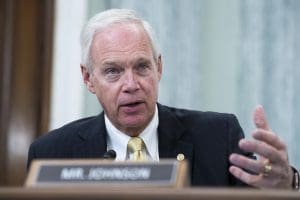Ron Johnson opposes federal aid to help US microchip industry compete against China
The Wisconsin Republican doesn’t want government to spend money ‘picking winners and losers.’

Sen. Ron Johnson (R-WI) has long made it clear that he does not believe it is his job to promote economic growth in his own state over others. During a hearing on March 23, he also indicated that he doesn’t believe the federal government should help support U.S. domestic businesses over foreign ones.
The Senate Committee on Commerce, Science, and Transportation was considering the Creating Helpful Incentives to Produce Semiconductors (CHIPS) for America Act, a bipartisan $52 billion bill to incentivize and promote semiconductor manufacturing in the United States.
Intel CEO Patrick Gelsinger testified in support of the package, noting that semiconductors are “foundational to every other industry” and that the legislation is urgently needed to restore domestic production in an industry “born in the United States.”
“Thus,” he told the committee, “we believe it’s justified to take such steps as the CHIPS Act.”
Johnson responded:
I think my concern is when government starts attempting to allocate capital, it just screws things up. It doesn’t do it very efficiently or effectively. I’m concerned, as opposed to pushing the unfair trade practice route, going that route, to just, well, let’s join in, let’s engage in the same type of activity.
It ends up with a misallocation of capital. Are you concerned about that? Because you have government picking the winners and losers in this case.
In February, Johnson refused a request by union workers at Oshkosh Defense, based in his own state, to help persuade their employer — one of Johnson’s top donors — to locate more than 1,000 new jobs in Wisconsin. The company was awarded a 10-year, $482 million contract with the U.S. Postal Service to build a new generation of delivery vehicles, but plans to make the fleet in Spartanburg, South Carolina.
“It’s not like we don’t have enough jobs here in Wisconsin,” Johnson told reporters at the time. “I think when using federal tax dollars, you want to spend those in the most efficient way, and if it’s more efficient, more effective to spend those in other states, I don’t have a real problem with that.”
Now he is openly objecting to the idea of the federal government helping American businesses compete against businesses in Asia, most importantly in China, Taiwan, and South Korea.
A Johnson spokesperson did not immediately respond to an inquiry for this story.
According to Sens. John Cornyn (R-TX) and Mark Warner (D-VA), who first proposed the bill in 2020 and have pushed to attach it to other legislation in this Congress, the CHIPS Act would “restore semiconductor manufacturing back to American soil by increasing federal incentives to stimulate advanced chip manufacturing, enable cutting-edge research and development, secure the supply chain and bring greater transparency to the microelectronics ecosystem, create American jobs, and ensure long-term national security.”
“In addition to securing our technological future, the CHIPS Act will create thousands of high-paying U.S. jobs and ensure the next generation of semiconductors are produced in the US, not China,” House sponsor Rep. Michael McCaul (R-TX) explained when the bill was introduced.
Johnson is currently facing a tough reelection race in Wisconsin after breaking a promise not to seek a third term. He has received a great deal of criticism from constituents over his refusal to fight to bring more jobs to the Badger State.
Johnson has repeatedly criticized President Joe Biden over supply chain issues, but has refused to back this and other legislation aimed at addressing them. In October, he told Fox Business, “I have no faith the government is gonna help anything out whatsoever. It was Ronald Reagan’s famous phrase, ‘I’m the federal government, I’m here to help,’ and people just roll their eyes. Government pretty well exacerbates all the problems.”
In September 2020, he endorsed international outsourcing, arguing: “To me it makes no sense for American workers to produce high-labor-content products. Let the billions of people around the world do that and provide us these goods — high quality, dirt cheap. That to me is economically efficient.”
A Marquette University Law School poll released earlier this month found just 33% of registered Wisconsin voters have a favorable view of Johnson, while 45% have an unfavorable view.
Published with permission of The American Independent Foundation.
Recommended

Biden calls for expanded child tax credit, taxes on wealthy in $7.2 trillion budget plan
President Joe Biden released his budget request for the upcoming fiscal year Monday, calling on Congress to stick to the spending agreement brokered last year and to revamp tax laws so that the “wealthy pay their fair share.”
By Jennifer Shutt, States Newsroom - March 11, 2024
December jobs report: Wages up, hiring steady as job market ends year strong
Friday’s jobs data showed a strong, resilient U.S. labor market with wages outpacing inflation — welcome news for Americans hoping to have more purchasing power in 2024.
By Casey Quinlan - January 05, 2024
Biden’s infrastructure law is boosting Nevada’s economy. Sam Brown opposed it.
The Nevada Republican U.S. Senate hopeful also spoke out against a rail project projected to create thousands of union jobs
By Jesse Valentine - November 15, 2023








































































